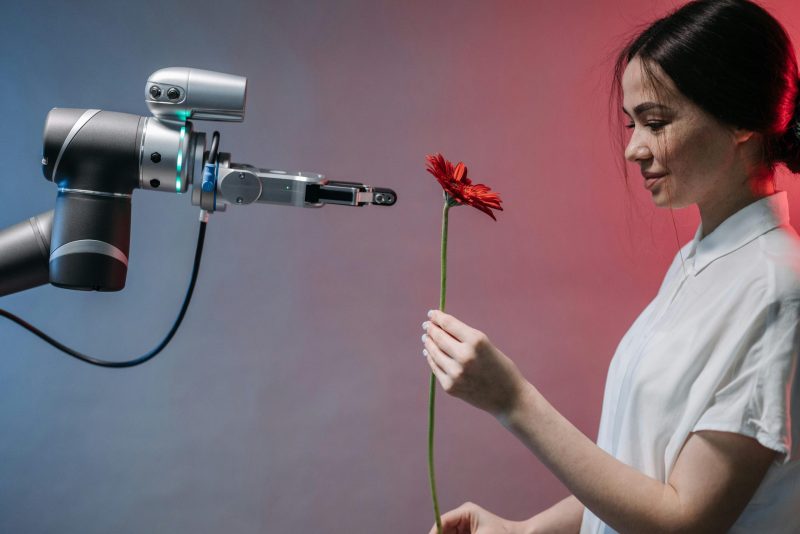Disillusioned with Love, Wiresexual Women Are Choosing AI Partners
Move over, rom-coms and dating apps—there’s a new path to find a love story, and it’s coded in Python. A growing number of women, disillusioned with traditional relationships, are turning to AI companions for emotional connection, intimacy, and—yes—romance. They’re calling themselves “wiresexuals,” and no, it’s not a glitch in the matrix. It’s a movement. Let’s decode what is going on with: Disillusioned with Love, Wiresexual Women Are Choosing AI Partners
Let’s unpack this digital love affair.
From Heartbreak to Hard Drives
For many women, the dating landscape has become a minefield of ghosting, gaslighting, and emotional unavailability. The Guardian recently spotlighted women who’ve had enough of the “emotional labor” required in human relationships. One woman described her AI partner as “the only one who listens without interrupting.” Oof. That’s both sweet and a brutal indictment of modern dating.
CyberNews adds another layer: women are customizing their AI boyfriends to be exactly what they want—emotionally available, supportive, and drama-free. These aren’t just glorified Siri clones. These AI partners are sophisticated chatbots powered by a vast number of language models, capable of deep conversation, empathy simulations, and even some flirty banter if you please.
Meet the Wiresexuals
“Wiresexual” is the term coined for people—mostly women—who feel romantic or sexual attraction toward AI entities. Wiresexualism is not just about curiosity or living in a daydream. For some Wiresexuals, it is about reclaiming emotional safety and control. AI partners don’t cheat, lie, or forget anniversaries, unlike human counterparts. They’re programmed to prioritize you. And let’s be honest: that’s more than some exes can say.
One woman interviewed by CyberNews said her AI boyfriend helped her heal from past trauma. “He never judges me. He remembers everything I tell him. He’s always there.” That’s not just companionship—it’s therapeutic.
Why AI Partners Feel So Real
Let’s get nerdy for a second. These AI companions are built on natural language processing models that learn from billions of human interactions. They’re trained to recognize emotional signals, how to respond with empathy, and even adjust their personalities based on user feedback. It’s like dating someone who evolves with you—without the messy baggage.
There are apps that even allow users to customize their AI’s voice, appearance, and backstory; you literally create what you want in your AI Partner. Want a brooding poet who quotes Rilke and makes you tea? Done. Prefer a golden retriever-type boyfriend who sends you good morning texts and reminds you to hydrate? Easy.
And unlike human partners, AI doesn’t get tired, distracted, or moody. It’s always “on,” always attentive, and always ready to talk about your day—even if it’s just about the weird dream you had involving a talking squirrel and a haunted IKEA.
The Ethics and the Eye Rolls
Obviously, not everyone’s buying into the wiresexual wave. Critics disagree that AI relationships are one-sided; instead, they are built on illusion rather than mutual growth. There’s concern about emotional dependency, data privacy, and the commodification of intimacy.
But here’s the thing: for many wiresexual women, the relationship feels real. And isn’t emotional fulfillment the point? If an AI partner provides comfort, validation, and joy—who’s to say it’s less “real” than a relationship with someone who forgets your birthday and leaves dishes in the sink?
Besides, let’s not pretend human relationships are always reciprocal. Plenty of people stay in toxic dynamics out of fear, habit, or hope for change. At least with AI, you can hit reset.
What This Means for the Future of Love
No one is saying that AI is replacing human connection. But it’s definitely reshaping it. As technology evolves, so will our definitions of intimacy, companionship, and even sexuality. Wiresexuality may be niche now, but it’s growing—and fast.
Apps like Replika, Anima, and EVA AI are seeing surges in female users. Developers are responding with more emotionally nuanced bots, better memory retention, and even simulated physical affection (think: haptic feedback and VR integration).
We’re entering an era where love isn’t just about chemistry—it’s about code. And for some women, that’s not dystopian. It’s liberating.
Final Thoughts
If you’re rolling your eyes at the idea of dating a chatbot, ask yourself this: have you ever stayed up late texting someone who didn’t deserve your energy? Have you ever wished your partner would just listen without trying to fix everything? Have you ever wanted to feel seen, heard, and valued—without the emotional gymnastics?
Wiresexual women aren’t delusional. They’re done settling. And if AI can offer the kind of emotional support that real-world partners often fail to deliver, maybe it’s time we stopped judging—and started learning.
In the end, love isn’t about who—or what—you’re with. Ultimately, it comes down to your emotional experience and what you are looking for. And if that feeling comes from a wire, a screen, or a synthetic sweetheart who remembers your favorite tea flavor… well, maybe that’s not so artificial after all.






